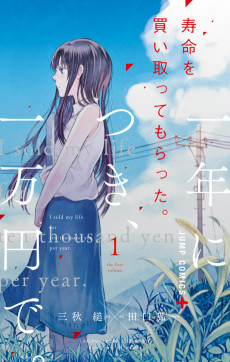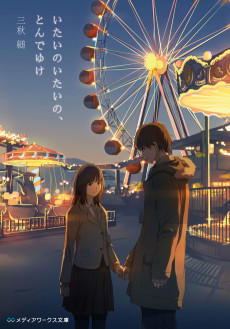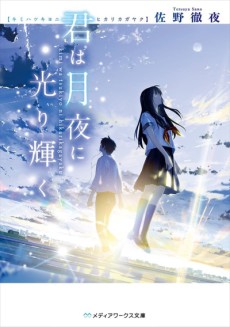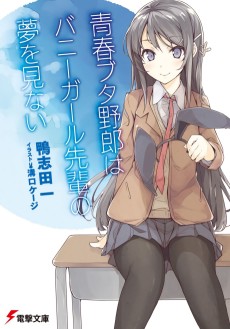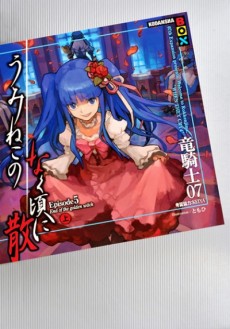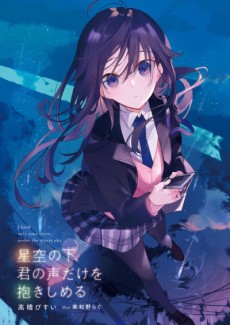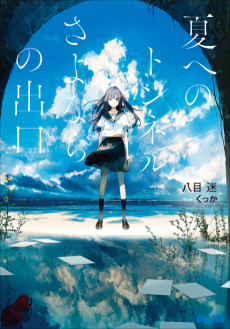MIKKAKAN NO KOUFUKU
STATUS
COMPLETE
VOLUMES
1
RELEASE
December 25, 2013
CHAPTERS
15
DESCRIPTION
HOW MUCH IS LIFE TRULY WORTH?
Kusunoki used to believe he was destined for great things. Ostracized as a child, he held on to a belief that a good life was waiting for him in the years ahead. Now approaching the age of twenty, he's a completely mediocre college student with no motivation, no dreams, and no money. After learning he can sell his remaining years-and just how little they're worth-he chooses to divest himself of all but his last three months. Has Kusunoki truly destroyed his last chance to find happiness...or has he somehow found it?
(Source: Yen Press)
CAST
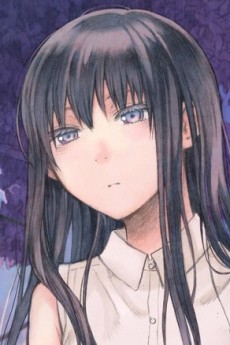
Miyagi
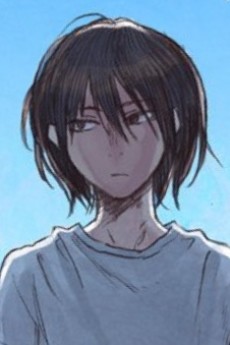
Kusunoki
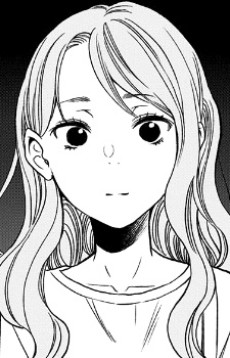
Himeno
CHAPTERS
RELATED TO MIKKAKAN NO KOUFUKU
REVIEWS

isyatup43
100/100A romantic tragedy masterpiece with deep philosophical ideas which explores an idea of the value of life.Continue on AniList
Three days of Happiness Light Novel Review
Let me introduce myself first, you may call me Isya and I am writing this review because I believe this novel (and maybe the manga), deserves way more than what I have seen around it so far. Personally, I believe that this story is rich, unique, and all the more fulfilling as a novel with quite a deep message to leave behind. Having said that, I also believe that the story is beyond the level offered by Your name, A silent voice, and Weathering with you. Forgive me if I have offended anyone here with my selfish endeavors, I really just think this book deserves a “blow up” in popularity as the films previously mentioned, of course I chose those three films in contrast because the stories of each have several similarities. I also apologize if my flow, or even my review is terrible, this is the first time I have ever written a review so I hope everyone would bear with me. Thank you.
If you are still with me so far, I will be splitting my review into four parts: 1. Introduction (this section) 2. Spoiler free review 3. With spoiler review 4. Closing remarks and a conclusion. With that said let us begin.
Spoiler-free
The story, based on its short synopsis “revolves around a shop where one can sell away the remaining years of their life, and the consequences of doing so. This generally leaves the deep and philosophical perspective to which this book offers leaving any reader such as myself with questions such as: 1. “How much does my life cost?” 2. “What does it take to have a meaningful life?” 3. “How should I spend the remaining time I have left?” 4. “What brings happiness?” And many more. With that in mind, the story follows the life of Kusunoki, an ordinary boy living a dull ordinary life. You will be experiencing the story from his perspective as this novel is written quite well in the first-person perspective and personally this has got to be the best way to express the story since the story requires the reader to understand, and maybe relate to Kusunoki, including his naivety, and hopelessness. Unfortunately, most of the parts I disliked regarding the book were because of Kusunoki’s hopelessness, and naivety since these were mostly featured at the earlier chapters of the story and I couldn’t help but feel terrible for him. Despite this, Kusunoki’s flaws feeds toward his development until the pinnacle of the story, and further brought toward the best possible ending this book has to offer. You may like it, you may dislike it, personally I loved it but that’s for any reader to decide I’m only here to provide my insight toward it. The book contains loads of drama, slice of life, and a bit of romance, I am not entirely sure how much more of the book’s content I should mention which would hook a potential reader without spoiling, but I guess it may be good to note that personally I was hooked after reading the first two chapters of the light novel. With that said, I hope that with my rather short spoiler-free review of the light novel has enticed any potential reader. I also hope that as much as possible if you are really planning to read the book, avoid the spoiler section, and just head straight toward the conclusion.
Spoiler
To start the section with spoilers, I’ll begin by warning the readers of this review that I will not be spoiling the ending of the book, rather I would just be including more information and insights with spoiling information as my spoiler-free review. I am still quite confident that any potential readers would enjoy the fruits to which this novel has to offer and with that let us begin. Terms to define since they were used often in the book and would be used here as well, or as I would say as “nomenclature.” 1. Observer – an observer in the novel is as invisible guardian who show up to “observe” usually in the last 3 months of a person who sold lifespan. The purpose of an observer is to prevent the one being observed from committing crime since it was described that the closer the person was to dying, the more psychotic, and deranged some of them can become. By being present, an observer is capable of terminating the person’s life sooner to prevent various crime such as murder from occurring. An observer is invisible to anyone and is only visible toward the person being observed. Observers are said to also be human beings; however, these humans sold their time which is the reason they have this job in the first place. 2. Time – the definition I’ll be discussing is the price of selling time, not the definition of time itself. In the book time from your life may be sold, and as described time being sold is equivalent to the amount of time the seller will be working in labor. The monetary value however would still of course vary on how meaningful you would have become; in the amount of time you had sold. As previously mentioned, selling time makes you pay for it by being an observer for the amount of time you sold. Completing the amount of time you sold, as described in the book, will allow you to live the remainder of your life with the amount of money received. (example: remainder of your life is 40 years, you sell 10 years, so you work as an observer for 10 years, after which you may live the rest of your 30 years with the money you received for the 10 years of labor). 3. Health – similar to time, the book rarely went about or even used health as the “selling” option however it was described that some people who lived long, died earlier after selling their health, likewise some people with terminal illnesses lived longer, having purchased life as the book described. 4. Lifespan – lifespan in the book was the simplest to understand. The remainder of your life will be given to you, and a price will be given to the amount of years of your life you are willing to sell. This in a way cuts your life short for a price. I assume the short synopsis of the spoiler-free section was read, so I will continue with the deep and philosophical message and perspective to which this book revolves around in. To be more precise, I will be discussing how the book manages to somewhat answer or discuss its version of it, at least by my interpretations. 1. “How much does my life cost?” The price of a human life in real life is of course believed to be one which is immeasurable. However, the book revolves around this philosophical idea, and with supernatural means, places a price toward the lives of beings in the story. The price is simply measured by supernatural means; your entire life from now until the day you die, is measured, then you will be offered a price for selling your life. The book offers three options to sell however: lifespan, health, and time. As the book slowly narrates, a person’s price would vary on how much contribution, fame, relevance, and meaning you have experienced in your life. The main protagonist of the story sold all but 3 months of his remaining life for 300,000 yen at the age of 20. 2. “What does it take to have a meaningful life?” This is to be discussed because in real life, a meaningful life is as well indescribable, just as how “what is the meaning of life?” is also a question impossible to answer. The book in context, have similar beliefs as of in real life. Having a meaningful life was also something immeasurable, or undescribed so well, however toward the ending of the book the growth of the main character can give a rather philosophical idea to the reader of how “a meaningful life” is to be defined it as well leaves an immeasurable value. In spoiler context, the main protagonist near the end of the book, has again sold the remainder of his life, specifically 30 days, but this time the value of his 30 days was worth 30 years in equivalent. This left me with a rather scale-able idea of how the book measures or even improves the price of a year, and even a day of a human being and adds a price toward it. 3. “How should I spend the remaining time I have left?” This of course is quite a difficult question to answer as well. In real life various opinions may open up on how this should be done. Of course, this only applies mostly to those with terminal illnesses, since in real life its impossible to measure how much time you have left since anything can happen at any time. People with terminal illnesses however are usually given a time frame, or range by their respective medical caretakers and would have to figure out the answer of how to spend the remaining time. In the book time is priced similar toward lifespan and even health. If you have 30 years left in your life, you may sell years of that life for a value. This goes the same for time, 30 years of your time at the price of 30 years of labor. Health being sold as described in the book: “some people with terminal illnesses live longer, and some people with long lives die earlier.” All of which are presented with a respective price. So how should a person spend the remainder of his/her life? The protagonist of the story, as previously mentioned, sold all but 3 months of his life. Due to this, he was provided 300,000 yen, and had to live the 3 months with an observer named Miyagi to keep watch of his actions. In the 3 months he lived, he did various tasks which he hoped would somewhat make him happy, or at least improve his last 3 months of life. In a way you can imagine this as a “bucket list” of tasks to accomplish and throughout the first half of the novel, the protagonist simply kept receiving negative outcomes as he accomplished each task up. But eventually he adjusted his tasks toward his own self-development, which was aimed toward his observer, Miyagi, after sharing a sentimental moment with one another. This brings about the second half to which he spent the most of what he had left in the best way he possible could and that was various activities with Miyagi. 4. “What brings happiness?” This one is probably the easiest question to answer among the previous questions. Happiness in real life is simply an emotion of joy, however, to answer of what brings happiness varies per individual. It is obvious to say that one thing that makes another happy, makes another sad and that is basically what happiness is all about. In the story, if I were to describe the book emotionally, as I had read it was like a letter “u”. At the earlier chapters, I kept feeling sad, unwell, and miserable, toward Kusunoki and of course to myself. This is because for the first half of the novel, you will be experiencing in first person, every unfortunate event that occurs with the protagonist. To be more precise, it consists of several accounts of tragedy, and even realizing that the life of a person can possibly become so meaningless which can possibly bring upon depressive thoughts and possibly suicide (which are present within this novel). But of course, as I described before these were quite necessary to showcase the second half of the book which were a slowly improving state of the main character from the previous. As I had previously stated, the unfortunate cost for the remainder of Kusunoki’s life was 300,000 yen. Toward the second half of the book, as he slowly began to act more selfless toward Miyagi, compared to being selfish in the first half, drew upon him a better him. If the entire supernatural phenomena of the book valued his life remainder to be 300,000 yen, to Miyagi, his life’s value cost would be 30 million, or even 3 billion. This further shows how Kusunoki’s character development, eventually lead to the best remaining months of his life leading to a romantic relationship with his observer, Miyagi, which to Kusunoki, was what brought him his happiness. That brings an end toward the philosophical questions previously mentioned, and how I interpreted each one from the messages of the book. To discuss the flow of the story, again I repeat the life of Kusunoki, an ordinary boy living a dull ordinary life. You will be experiencing the story from his perspective; this includes his thoughts and desires. I previously mentioned this being a first-person narrative story being the best way to present such, is duly because all of the experiences Kusunoki experienced in the first half of the novel were extremely necessary, despite being quite miserable. This in turn will lead the readers to sympathize, dislike, and even hate on Kusunoki, for various decisions which has or may have committed. The thing I disliked the most about Kusunoki was not how naïve he was, but more on the hopelessness. I hated how he simple sold a huge portion of his life without a second thought, or even how he attempted to abuse Miyagi for his own selfish desires. I despised Kusunoki for expecting that his lifespan would cost so much more without even attempting to do more out of himself and attempted to commit acts which I believed would turn him into a person worse than scum. But I guess that was the purpose the novel aimed for, to elaborate on Kusunoki’s life decisions, feelings, how hopeless he really is, and how eventually the reader may sympathize with him as a genuine person. Because of how his earlier chapters were, I personally loved his huge improvement, and how the turn of events went as he slowly improved for the better. The thing I probably loved the most is how Kusunoki, and Miyagi interact with one another, to which I simply describe as a romantic tragedy conversed between two unfortunate individuals. And with that, my spoiler content review is complete.
Conclusion
The story immediately became one of my favorites and I see it as a story with the same potential as the aforementioned films: Your Name, A Silent Voice, and Weathering with you. I confess however, that I had only read an English translated copy of this book for I do not speak nor read Japanese, and I wish to purchase an English copy of it soon to further support the author in hopes that it would someday help improve sales and popularity. I solemnly hope that this light novel will soon become a film. P.S. The book was released together with a short story by the author titled “I Say A Little Prayer” which I highly recommend reading after this book. Again, I apologize if ever my review was terrible, its my first time writing one but whether you are here at the end with me or not, I’d still leave my thanks and I hope you enjoy the story as much as I did. edit: I fixed my html on this for better reading and viewing experience.

SoulBlade17
90/100A thought provoking tale that makes us question the value of life.Continue on AniListPlease note This review is all subjective and my own personal opinion. You do not have to agree with it, nor am I asking you to. I hope that this just helps you get an idea of what the novel I am talking about is like and form a basic and general consensus on it. The ratings I give anime and manga are mostly my personal overall enjoyment. This review may contain some spoilers, but all of them will be hidden using the spoiler tag. I will probably be rambling for a lot of the review, so the TL;DR at the bottom will help a lot. Introduction 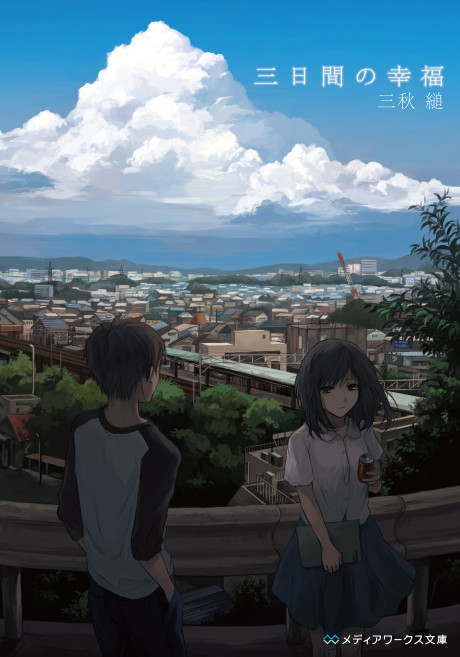
Three Days of Happiness, written by Miaki Sugaru is a light novel depicting the story of Kusunoki, a run down college student with no hopes and dreams, discovers a mysterious store which buys three things, lifespan, time, and health. After selling all but his last three months, has he finally found happiness?
Plot It might be hard for me to talk about the plot of this novel, as it can be said it is what is communicated without words is just as important as what is told through words. The whole 'show do not tell' saying. Whilst this novel does tell a lot through its words, at the same time just as much is conveyed without words. Forgive me for rambling, but I just wanted to note the importance of such a thing. The beginning few chapters are sort of a slow start, with it providing set up and foundations for the rest of the novel. The first chapter is some character building mostly concerning Kusunoki, giving us some idea on his past and personality. From there his decision to sell his life happens pretty quickly so the novel does not waste much time in getting things moving with the main show.
Presentation wise the plot is fairly simple at first glance, but how it makes you think is something else entirely. This novel will certainly get you thinking, posing the reader with a lot of philosophical questions that cannot be answered easily. Not only do the characters ask this themselves, you do too. In doing so, I became much more immersed in reading the novel. Perhaps I was just continuing to read to find the answers that were being asked. Some of the questions asked in the novel include (courtesy of isyatup's review):
- “How much does my life cost?”
- “What does it take to have a meaningful life?”
- “How should I spend the remaining time I have left?”
- “What brings happiness?”
As you can see, it is hard to answer these questions. Only by progressing through the story, we can see what answers the characters discover, a key drawing point of the novel. And just maybe, we will find an answer ourselves.
What happens in the plot is fairly mundane at first glance, but coupled with the characters and the philosophical aspect of the novel it can become quite engrossing to read.
Pacing is a key part of the novel to discuss here. As I stated earlier, the first few chapters serve has foundation building for the novel. As such, it can seem to be slow at the beginning. I would say the novel does not really take off until the second half, in which it got really good or me. You could describe this novel as a slow burn, with the beginning being fuel to the flame and then in the later parts it bursts into something much more. Overall, it all flowed nicely. That said, the slow beginning can be a turnoff to some readers. It takes some time for the novel to get really interesting, so I would suggest trying to stick through it. The novel is not too long either.
Plot development is another important part to discuss. For the most part, the development was well thought out and paced. I really liked how things played out in the later parts of the novel, how things changed. There were times where the development was more subtle, and other times where it was more obvious. Most of the time I was not able to correctly predict what was going to follow, so I was satisfied in being mildly surprised as to what would happen next. I cannot really go into too much detail about the development with spoilers in mind, but it was one aspect of the novel I enjoyed.
Characters The characters presented in this novel are vital parts of the story, and there are not many characters to speak of. In the AniList entry of Three Days of Happiness there are only three characters and really, there are not much more. Most of the other characters that appear are either unnamed and insignificant or only play a part in the late parts of the story.

____This is Kusunoki, one of the main characters in the story. His face is not drawn in the novel, but you can see it in the manga.____ The entirety of the novel is written in first person from his perspective. The first person perspective allows for the novel to be more personal, and more easily write his emotions and feelings throughout. The way this was written was done quite adeptly, with his feelings being clear to me, the reader. Sometimes I could feel them myself, although I could just be exaggerating things.
Kusunoki is presented as a pretty miserable and hopeless character. He is different from the hopeful and cheerful leads that appear in a lot of what I read these days. This in turn made him a more fascinating character to read. His perspective on the world was quite pessimistic, which I suppose was something fresh to me. With this in mind, he can be an unlikable character, but keep a close eye on how he changes.

____Here is Miyagi, the second main character of Three Days of Happiness.____ She is quite the important character, she appears in most of the chapters after her introduction. If I had to describe her, I would say she is a little cold. She certainly makes that kind of impression when she is first introduced. But ultimately, she is more than that. I do not want to say much more than that since really, it is her development and that is something that should be experienced for yourself. Her relationship with Kusunoki is another key part of the novel, and one of the most compelling parts too. This is listed as a romance after all, so such a relationship can be expected. How they interacted and depended on each other was enjoyable to read, and it was heart warming too at times, breaking up the tragic themes the novel presents to the reader.
Another notable character in the story is Himeno. She does not have an illustration in the novel so I have no image to show of her here, but you can easily find some art of her on her character page. She is perhaps the only childhood friend Kusunoki had, and she played a vital role as to who Kusunoki came to be in his twenties. She has some similarities with Kusunoki, with them both being unable to fit in with others. I do not want to say much else as she plays a vital role in one of the later chapters, and to discuss her further may be some spoilers. But overall, she was an intriguing character, and seeing how both Kusunoki and Himeno heavily effected each other was engaging. Himeno often appears in Kusunoki's internal dialogue, so it is quite apparent as to how significant she is to him.
Other than the characters I have mentioned above, there is almost no one else to speak of. In the later parts of the story some other minor characters play a role, but for the most part it is just the main two. That said, the roles the minor characters play in the later parts of the story were written and implemented well. They did not feel like meaningless background characters, and added more to the story. By having only a few characters in the spotlight, the development and relationships of those characters are focused on and it is easier to craft better development with them. It also helps in focusing the reader's attention to them only. Whilst the main two may be unlikable at first, this only emphasises the changes they go through.
Comparison between the manga and the original Not only did this novel get a manga adaptation, but the novel itself is a rewrite of a web novel the author Miaki Sugaru posted on the website 2ch.
The manga adaptation may be the more favourable option for many people to experience this story. It is understandable, as reading manga takes less effort than novels, it is faster to read, and it also provides art. There are some things only manga can do, but the same thing can be said about novels too. One difference I found when reading the manga was the pacing. This was probably something due to the form of media, but it was much faster to read as compared to the novel. The events between the manga and novel are mostly the same, but the manga plays out faster as there are less words to go through. I personally preferred the slower pace the novel had, allowing things to develop with more time, but the swifter pace of the manga may be more appealing to others.
Of course, there is also the visual aid of the art provided by the manga. The art adapted scenes from the novel accurately and faithfully. After reading the novel, it was nice to see the images that I conjured up in my head manifested. The novel did quite well to illicit vivid imagery of both the settings and characters presented, but I also liked seeing it showcased through art too. Both media formats were able to build a stimulating world and characters, so in the end it really comes down to preference.
Although most of the plot stays the same, there are some changes. Most are not significant and I could not really remember much, but one I recall was after Kusunoki meets Himeno he decides to do something with the money he planned to give her. In the novel, he gives it out to random passers-by, whereas in the manga he throws it all off a bridge into the ocean. Whilst the manga's depiction of that event is more symbolic, Kusunoki's act in the novel better links to Miyagi's comment on their "altruistic" acts.
Moreover, the manga has two extra chapters. The first extra chapter seems to be something new, or at least something that was in the novel. I could not recall anything in the novel that was similar to what happened in the first extra chapter, but I could be wrong. The second extra chapter adapts a short story the author wrote called 'I Say a Little Prayer'. It is a pretty faithful adaptation but the web novel version has some more detail in it.
The original web novel is essentially a shorter version of the published novel with some plot differences. One notable difference in the story is that Kusunoki's family makes an appearance in the original, whereas in the novel Kusunoki only mentions them in passing. This was an interesting change, but ultimately both formats show the disdain he has against his family, but perhaps more so in the web version.
You might be faced with the question as to whether you should read the manga or the light novel of Three Days of Happiness. In the end, it comes down to your preferences. Whilst I personally preferred the novel (partly because I read that first), the manga was still a good read, and a pretty faithful adaptation. If you like reading novels and prefer a slower paced story then by all means read the novel. If you do not like reading novels and prefer manga, then perhaps the manga is the better option for you. You would still get to experience a great story either way. For those who enjoyed the manga adaptation, you might be interested in reading the novel too. Seeing the same story but in a different way can be enthralling. The web novel is not a must read if you read either the manga or novel, but it is nice to see how it all originated.
Conclusion and TL;DR I recall the scores I was giving the novel as I read. The beginning parts were a 70 or so, not too bad but things were not too interesting at that point. But as I continued to read on, the score kept getting higher and higher. The ending is what really raised the score for me, I found it to be wonderful. It was quite touching and emotional, not many forms of media can make me feel that way. You could say that the whole novel was just build up for the ending. I am glad that I read this novel, and it easily became one of my favourites. I cannot recommend this to everyone, but for those who want a thought provoking philosophical tale with some romance then this should be up your alley. My review cannot properly put this novel into words, it is an experience that in the end you would need to experience yourself to understand. I may be overpraising this work, but at the end of the day what matters is I enjoyed Three Days of Happiness. In summary:
- The novel has a slow burn to it, taking its time before it kicks off. From there, it becomes highly engaging and immersive.
- It poses deep questions to both the characters and the reader to ponder on which makes it all the more engaging.
- The main characters may be unlikable at first, but their development makes up for it.
- Both the characters and the relationships they hold are a fascinating read.
- The development of the plot and characters were both well thought out.
- Both the novel and manga are good ways to experience the story.
If you are still here at the end of review and made it through my ramblings, I thank you. I would also recommend reading isyatup43's review on Three Days of Happiness, they go into better detail on the philosophical elements of this novel. If you want to send me feedback on my reviews, please post a comment on this thread. Hopefully you were able to get something out of this review. If you did not like this review, then I apologise for wasting your time.

Chrysalism
100/100An earnestly compelling story about fools who create their own hell by a person who wanted to sell his lifespan too.Continue on AniListI've encountered numerous stories about an MC who is a hopeless shell of their former selves. Much of those stories had an irresistibly sweet girl turn them back into a hopeful person again. So, was this novel also only about a meeting of two soulmates?
For me, it was much more than that. It was an incredibly compelling tale, especially for those readers who've wished to sell their own life span at some point in their lives. It gracefully describes loneliness in it's rawest form and how people, when free from the shackles of life, start craving for those chains around their soul once again and then having to face an even greater depression.
The story starts at the lowest point of the MC, Kusonoki's, life yet, and continues to grow more morose while simultaneously getting enriched with some very impactful characterisation and developments oh-so very natural.
There is one aspect of storytelling that I really adore, or if I'm being a little haughty; a standard I use to judge it, that is, the deftness to present something incredibly ordinary in a way that feels like "there is nothing better than this". Whenever I'm caught living lifelessly in my mundane life, I'm reminded that "Ah! These little things are what I found so beautiful in that book..", and that alone makes me a teeny bit happy. And make no mistake, this novel does it to a tee.To the ones that either love a "_happy_" end or a "_sad_" one, they'll enjoy it's conclusion regardless, as they come to appreciate the journey. Personally, it was one of the most satisfying endings. Alluringly enough, few of it's ample of great pages come after the story is complete. That is, author Miaki's afterword. While this beautiful story may very well be conceived as one, Miaki himself mentions that this isn't a grandiose tale about value of life/love, rather a piece of writing meant for that moment where those people pained by their own shallow breaths learn it's beauty when they're about to enter the realm where none may be taken. And I love it all the more for that. In short, __it is an experience to be had__. # The lesson I learned after having parted with this book?# ~~It is much more charming to close your own umbrella and get drenched with the other person than offer them yours. Even if both of you happen to fall ill.~~ We all wish to feel, to be useful to someone, to anyone. And that isn't really a negative thing. On the contrary, I find it incredibly poignant. Also, I never really parted with this book cause I'll be for sure revisiting this piece of beauty now and again :) _P.S.- Do read a short story from the other MC Miyagi's POV that came alongside this novel called "I Say A Little Prayer", after this novel has been read._
SIMILAR MANGAS YOU MAY LIKE
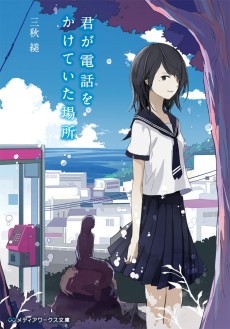 NOVEL PsychologicalKimi ga Denwa wo Kakete Ita Basho
NOVEL PsychologicalKimi ga Denwa wo Kakete Ita Basho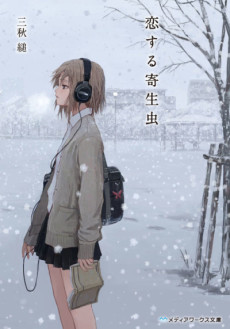 NOVEL DramaKoisuru Kiseichuu
NOVEL DramaKoisuru Kiseichuu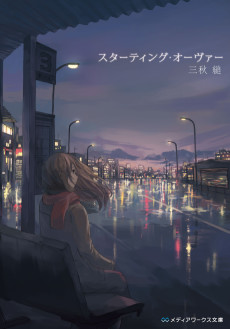 NOVEL DramaStarting Over
NOVEL DramaStarting Over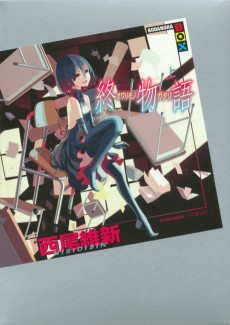 NOVEL DramaOwarimonogatari
NOVEL DramaOwarimonogatari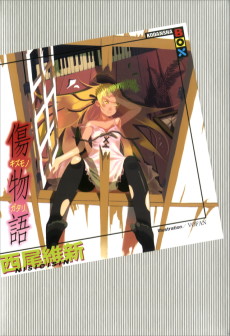 NOVEL ActionKizumonogatari
NOVEL ActionKizumonogatari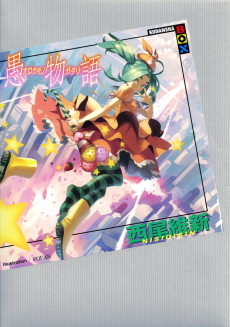 NOVEL ComedyOrokamonogatari
NOVEL ComedyOrokamonogatari
SCORE
- (4.4/5)
MORE INFO
Ended inDecember 25, 2013
Favorited by 1,972 Users

